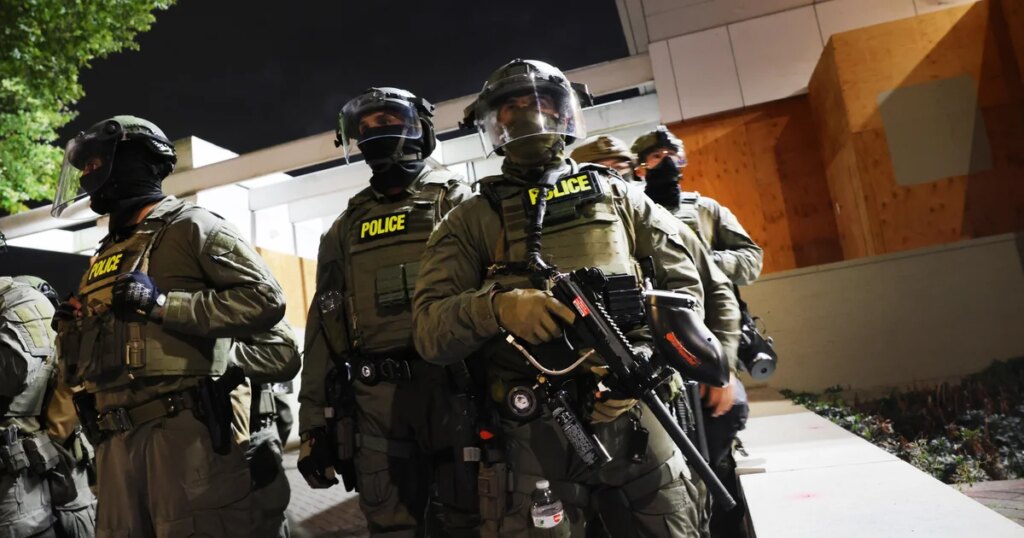In a significant escalation of the federal government’s immigration enforcement efforts, the Department of Homeland Security (DHS) initiated operations in Charlotte, North Carolina, over the weekend. Dubbed “Charlotte’s Web,” this operation aims to apprehend individuals residing illegally in the area. The move has sparked controversy and concern among local officials and community members, who fear it will exacerbate anxiety within immigrant populations.
| Article Subheadings |
|---|
| 1) Overview of the Operation |
| 2) Immediate Outcomes |
| 3) Broader Implications |
| 4) Local Response |
| 5) Future Operations Planned |
Overview of the Operation
The operation named “Charlotte’s Web” commenced on Saturday as part of the Trump administration’s intensified focus on curbing illegal immigration across the United States. DHS confirmed the deployment of Border Patrol agents to the Charlotte area, with plans to target those residing unlawfully. The initiative is part of a broader crackdown on illegal immigration that has been a cornerstone of the administration’s policy agenda.
The operation was characterized by a significant presence of law enforcement personnel, including well-known figures such as Commander Gregory Bovino, who has a history of leading controversial operations. The DHS spokesperson Tricia McLaughlin emphasized the operation’s aim to protect public safety, stating, “We are surging DHS law enforcement to Charlotte to ensure Americans are safe and public safety threats are removed.”
Immediate Outcomes
The first day of “Charlotte’s Web” reportedly led to the apprehension of 131 individuals, according to DHS statements on Monday. This number reflects not only arrests made by Border Patrol but also by Immigration and Customs Enforcement (ICE) agents. The operation sees a robust application of resources, including armored vehicles and specialized teams to execute the mission effectively.
Reports from the ground indicated that Border Patrol agents, identifiable by their green uniforms, were actively involved in carrying out these arrests. Videos circulating on social media illustrated the extent of law enforcement activity, further amplifying community concerns about the operation’s impact.
Broader Implications
The operation in Charlotte is part of a more extensive strategy by the Trump administration, which has seen immigration enforcement efforts targeting multiple cities across the nation. The DHS has positioned these operations as necessary for promoting public safety and ensuring that individuals who pose a criminal threat are removed from communities.
However, these sweeping initiatives have raised alarms about the potential criminogenic consequences on local neighborhoods. Critics argue that such operations can lead to an environment of fear, particularly among immigrant communities, who may be less likely to report crimes or cooperate with law enforcement for fear of deportation.
Local Response
The response from local officials has been swift and critical. Charlotte’s Mayor, Vi Lyles, along with various community leaders, voiced concerns regarding the operation’s repercussions on immigrant residents. In a joint statement, they argued that the actions of federal law enforcement are “causing unnecessary fear and uncertainty,” highlighting the potential for these arrests to disrupt families and entire communities.
Local advocacy groups have echoed these sentiments, organizing initiatives aimed at providing support and resources for those affected by the operation. The anxieties within the immigrant community have prompted many residents to seek guidance on their rights and available legal protections.
Future Operations Planned
Following the completion of operations in Charlotte, reports suggest that Border Patrol’s focus will shift to New Orleans, Louisiana, where a new operation, “Catahoula Crunch,” is expected to unfold. Plans indicate the mobilization of up to 200 agents, suggesting that the administration’s crackdown on illegal immigration will continue unabated.
This strategy emphasizes the administration’s commitment to extensive immigration enforcement as a means to promote perceived public safety concerns. As these operations move across various cities, they are likely to remain a contentious issue in local and national dialogues surrounding immigration policy and human rights.
| No. | Key Points |
|---|---|
| 1 | DHS launched “Charlotte’s Web” to target illegal immigrants. |
| 2 | 131 arrests were made during the operation’s first day. |
| 3 | Local officials have criticized the operation for instilling fear. |
| 4 | The initiative sparked conversations about human rights and safety. |
| 5 | Future operations are planned in cities like New Orleans. |
Summary
The initiation of the “Charlotte’s Web” operation highlights the ongoing complexities of immigration policy in the United States. As the federal government intensifies its enforcement actions, the ramifications for local communities, especially among immigrants, continue to raise pressing ethical and social questions. The response from leaders and advocacy groups underscores the critical conversations about public safety, human rights, and community trust that are at stake during such operations.
Frequently Asked Questions
Question: What is the primary goal of ‘Charlotte’s Web’ operation?
The primary goal of the ‘Charlotte’s Web’ operation is to apprehend individuals living in the area illegally, as part of the Trump administration’s broader strategy to enforce immigration laws.
Question: How many arrests were reported during the operation’s first day?
During the operation’s first day, DHS reported a total of 131 arrests, encompassing detentions made by both Border Patrol and ICE agents.
Question: What has been the reaction from local officials regarding the operation?
Local officials, including Charlotte’s Mayor, have criticized the operation, asserting that it fosters fear and uncertainty within immigrant communities.
